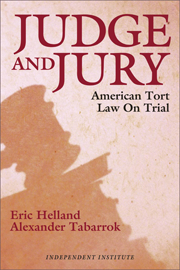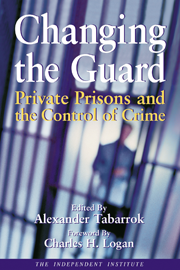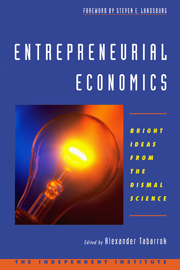Justice is supposed to be blind, but that fiction is hard to maintain when lawyers contribute millions of dollars to the election campaigns of favored judges. In states like Texas, Alabama, and West Virginia, where judicial elections are vigorously partisan, it’s not uncommon for judges to collect hundreds of thousands or even millions of dollars in campaign contributions. Suspiciously, most contributions come from lawyers who invariably find themselves with cases before these same judges.
Big money judicial elections intersect with another shameful secret of American courts: “home cooking,” the tendency of state courts to be biased against out-of-state corporate defendants. Richard Neely, a member of the West Virginia Court of Appeals, explained his incentives as an elected judge this way: “As long as I am allowed to redistribute wealth from out-of-state companies to injured in-state plaintiffs, I shall continue to do so. Not only is my sleep enhanced when I give someone else’s money away, but so is my job security, because the in-state plaintiffs, their families, and their friends will reelect me.”
“It should be obvious,” continued Neely, “that the in-state local plaintiff, his witnesses, and his friends, can all vote for the judge, while the out-of-state defendant can’t even be relied upon to send a campaign donation.”
Robert Bork agrees, writing that punitive damages in particular do nothing but punish “the out-of-state corporation for the crime of being from out of the state.”
Although there is no shortage of anecdotes illustrating judicial politics run amok, very little in the way of systematic evidence has been collected. Are awards against out-of-state defendants really larger than average in states using partisan judicial elections? Are awards against out-of-state defendants larger in partisan elected states than in states which appoint their judges? To answer these questions, we collected data on over 7000 personal injury tort cases. In each case, we identified whether the defendant was a corporation, and if so, whether the corporation was headquartered in-state or out-of-state. We then compared the average award in partisan states with the average award in non-partisan states when the defendant was an out-of-state corporation. We did the same thing for cases involving an in-state defendant. The results were shocking.
|
|
|||
| Partisan | Non-Partisan | Difference in Awards Due to Electoral System | |
| Out-of-State Defendant | $652,720 | $384,540 | $268,180 |
| In-State Defendant | $276,320 | $207,957 | $68,363 |
| Difference in Awards due to Defendant Headquarters | $376,400 | $176,583 | |
TABLE 1 shows that out-of-state corporations are penalized in both partisan and non-partisan states. Out-of-state corporations can expect to pay nearly four hundred thousand dollars more than in-state corporations in partisan states and nearly two hundred thousand more in non-partisan states. The real surprise, however, is that the bias against out-of-state corporations is much larger in partisan than in non-partisan states. The average award against in-state defendants is about the same in either type of state (the $68,363 difference is not large enough to be statistically significant). But the average award against an out-of-state defendant is $268,180 higher in a partisan state than it is in a non-partisan state (a difference which is highly statistically significant). Out-of-state corporations, therefore, have good reason to fear being sued in states like Texas, Alabama, and West Virginia where elected judges eagerly solicit campaign contributions from lawyers interested in larger awards.
Are all judges in partisan elected states biased against out-of-state corporations? Of course not. It’s safe to say that most judges, whether elected or appointed, rule without bias. But all it takes to drive awards sky high is a single judge willing to steer juries towards multi-million dollar awards. Forum shopping will do the rest. It’s no accident that lawyers from across the United States fly to Alabama to file their class action suits. Nor that the great plaintiff’s lawyer Jere Beasley has won most of his famous cases before a single judge in Barbour county, Alabama. A judge who just happened to be Beasley’s former law partner.
What can be done about this injustice? Abandoning partisan elections is one step in the right direction. Our evidence shows that the “merit system,” basically appointment by the governor followed by an up or down retention election by the people, does reduce run-away awards. More fundamentally, however, we need to reform the tort system. When tort law puts almost no limit on punitive awards or on the absurdity of claimed harms is it any surprise that lawyers and judges can use the system to pillage defendants of all kinds? Limit awards to scientifically-proven compensatory damages and lawyers will have little to buy because judges will have little to sell.












